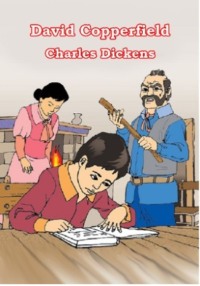
Полная версия
Oliver Twist
‘Ah, there’s promptness,’ said the undertaker.
‘Promptness, indeed!’ replied the beadle. ‘But what’s the consequence; what’s the ungrateful behaviour of these rebels, sir? Why, the husband sends back word that the medicine won’t suit his wife’s complaint, and so she shan’t take it—says she shan’t take it, sir! Good, strong, wholesome medicine, as was given with great success to two Irish labourers and a coal-heaver, only a week before—sent ‘em for nothing, with a blackin’-bottle in,—and he sends back word that she shan’t take it, sir!’
As the atrocity presented itself to Mr. Bumble’s mind in full force, he struck the counter sharply with his cane, and became flushed with indignation.
‘Well,’ said the undertaker, ‘I ne—ver—did—’
‘Never did, sir!’ ejaculated the beadle. ‘No, nor nobody never did; but now she’s dead, we’ve got to bury her; and that’s the direction; and the sooner it’s done, the better.’
Thus saying, Mr. Bumble put on his cocked hat wrong side first, in a fever of parochial excitement; and flounced out of the shop.
‘Why, he was so angry, Oliver, that he forgot even to ask after you!’ said Mr. Sowerberry, looking after the beadle as he strode down the street.
‘Yes, sir,’ replied Oliver, who had carefully kept himself out of sight, during the interview; and who was shaking from head to foot at the mere recollection of the sound of Mr. Bumble’s voice.
He needn’t haven taken the trouble to shrink from Mr. Bumble’s glance, however; for that functionary, on whom the prediction of the gentleman in the white waistcoat had made a very strong impression, thought that now the undertaker had got Oliver upon trial the subject was better avoided, until such time as he should be firmly bound for seven years, and all danger of his being returned upon the hands of the parish should be thus effectually and legally overcome.
‘Well,’ said Mr. Sowerberry, taking up his hat, ‘the sooner this job is done, the better. Noah, look after the shop. Oliver, put on your cap, and come with me.’ Oliver obeyed, and followed his master on his professional mission.
They walked on, for some time, through the most crowded and densely inhabited part of the town; and then, striking down a narrow street more dirty and miserable than any they had yet passed through, paused to look for the house which was the object of their search. The houses on either side were high and large, but very old, and tenanted by people of the poorest class: as their neglected appearance would have sufficiently denoted, without the concurrent testimony afforded by the squalid looks of the few men and women who, with folded arms and bodies half doubled, occasionally skulked along. A great many of the tenements had shop-fronts; but these were fast closed, and mouldering away; only the upper rooms being inhabited. Some houses which had become insecure from age and decay, were prevented from falling into the street, by huge beams of wood reared against the walls, and firmly planted in the road; but even these crazy dens seemed to have been selected as the nightly haunts of some houseless wretches, for many of the rough boards which supplied the place of door and window, were wrenched from their positions, to afford an aperture wide enough for the passage of a human body. The kennel was stagnant and filthy. The very rats, which here and there lay putrefying in its rottenness, were hideous with famine.
There was neither knocker nor bell-handle at the open door where Oliver and his master stopped; so, groping his way cautiously through the dark passage, and bidding Oliver keep close to him and not be afraid the undertaker mounted to the top of the first flight of stairs. Stumbling against a door on the landing, he rapped at it with his knuckles.
It was opened by a young girl of thirteen or fourteen. The undertaker at once saw enough of what the room contained, to know it was the apartment to which he had been directed. He stepped in; Oliver followed him.
There was no fire in the room; but a man was crouching, mechanically, over the empty stove. An old woman, too, had drawn a low stool to the cold hearth, and was sitting beside him. There were some ragged children in another corner; and in a small recess, opposite the door, there lay upon the ground, something covered with an old blanket. Oliver shuddered as he cast his eyes toward the place, and crept involuntarily closer to his master; for though it was covered up, the boy felt that it was a corpse.
The man’s face was thin and very pale; his hair and beard were grizzly; his eyes were bloodshot. The old woman’s face was wrinkled; her two remaining teeth protruded over her under lip; and her eyes were bright and piercing. Oliver was afraid to look at either her or the man. They seemed so like the rats he had seen outside.
‘Nobody shall go near her,’ said the man, starting fiercely up, as the undertaker approached the recess. ‘Keep back! Damn you, keep back, if you’ve a life to lose!’
‘Nonsense, my good man,’ said the undertaker, who was pretty well used to misery in all its shapes. ‘Nonsense!’
‘I tell you,’ said the man: clenching his hands, and stamping furiously on the floor,—‘I tell you I won’t have her put into the ground. She couldn’t rest there. The worms would worry her—not eat her—she is so worn away.’
The undertaker offered no reply to this raving; but producing a tape from his pocket, knelt down for a moment by the side of the body.
‘Ah!’ said the man: bursting into tears, and sinking on his knees at the feet of the dead woman; ‘kneel down, kneel down —kneel round her, every one of you, and mark my words! I say she was starved to death. I never knew how bad she was, till the fever came upon her; and then her bones were starting through the skin. There was neither fire nor candle; she died in the dark—in the dark! She couldn’t even see her children’s faces, though we heard her gasping out their names. I begged for her in the streets: and they sent me to prison. When I came back, she was dying; and all the blood in my heart has dried up, for they starved her to death. I swear it before the God that saw it! They starved her!’ He twined his hands in his hair; and, with a loud scream, rolled grovelling upon the floor: his eyes fixed, and the foam covering his lips.
The terrified children cried bitterly; but the old woman, who had hitherto remained as quiet as if she had been wholly deaf to all that passed, menaced them into silence. Having unloosened the cravat of the man who still remained extended on the ground, she tottered towards the undertaker.
‘She was my daughter,’ said the old woman, nodding her head in the direction of the corpse; and speaking with an idiotic leer, more ghastly than even the presence of death in such a place. ‘Lord, Lord! Well, it is strange that I who gave birth to her, and was a woman then, should be alive and merry now, and she lying there: so cold and stiff! Lord, Lord!—to think of it; it’s as good as a play—as good as a play!’
As the wretched creature mumbled and chuckled in her hideous merriment, the undertaker turned to go away.
‘Stop, stop!’ said the old woman in a loud whisper. ‘Will she be buried tomorrow, or next day, or to-night? I laid her out; and I must walk, you know. Send me a large cloak: a good warm one: for it is bitter cold. We should have cake and wine, too, before we go! Never mind; send some bread—only a loaf of bread and a cup of water. Shall we have some bread, dear?’ she said eagerly: catching at the undertaker’s coat, as he once more moved towards the door.
‘Yes, yes,’ said the undertaker,‘of course. Anything you like!’ He disengaged himself from the old woman’s grasp; and, drawing Oliver after him, hurried away.
The next day, (the family having been meanwhile relieved with a half-quartern loaf and a piece of cheese, left with them by Mr. Bumble himself,) Oliver and his master returned to the miserable abode; where Mr. Bumble had already arrived, accompanied by four men from the workhouse, who were to act as bearers. An old black cloak had been thrown over the rags of the old woman and the man; and the bare coffin having been screwed down, was hoisted on the shoulders of the bearers, and carried into the street.
‘Now, you must put your best leg foremost, old lady!’ whispered Sowerberry in the old woman’s ear; ‘we are rather late; and it won’t do, to keep the clergyman waiting. Move on, my men,—as quick as you like!’
Thus directed, the bearers trotted on under their light burden; and the two mourners kept as near them, as they could. Mr. Bumble and Sowerberry walked at a good smart pace in front; and Oliver, whose legs were not so long as his master’s, ran by the side.
There was not so great a necessity for hurrying as Mr. Sowerberry had anticipated, however; for when they reached the obscure corner of the churchyard in which the nettles grew, and where the parish graves were made, the clergyman had not arrived; and the clerk, who was sitting by the vestry-room fire, seemed to think it by no means improbable that it might be an hour or so, before he came. So, they put the bier on the brink of the grave; and the two mourners waited patiently in the damp clay, with a cold rain drizzling down, while the ragged boys whom the spectacle had attracted into the churchyard played a noisy game at hide-and-seek among the tombstones, or varied their amusements by jumping backwards and forwards over the coffin. Mr. Sowerberry and Bumble, being personal friends of the clerk, sat by the fire with him, and read the paper.
At length, after a lapse of something more than an hour, Mr. Bumble, and Sowerberry, and the clerk, were seen running towards the grave. Immediately afterwards, the clergyman appeared: putting on his surplice as he came along. Mr. Bumble then thrashed a boy or two, to keep up appearances; and the reverend gentleman, having read as much of the burial service as could be compressed into four minutes, gave his surplice to the clerk, and walked away again.
‘Now, Bill!’ said Sowerberry to the grave-digger. ‘Fill up!’
It was no very difficult task, for the grave was so full, that the uppermost coffin was within a few feet of the surface. The grave-digger shovelled in the earth; stamped it loosely down with his feet: shouldered his spade; and walked off, followed by the boys, who murmured very loud complaints at the fun being over so soon.
‘Come, my good fellow!’ said Bumble, tapping the man on the back. ‘They want to shut up the yard.’
The man who had never once moved, since he had taken his station by the grave side, started, raised his head, stared at the person who had addressed him, walked forward for a few paces; and fell down in a swoon. The crazy old woman was too much occupied in bewailing the loss of her cloak (which the undertaker had taken off), to pay him any attention; so they threw a can of cold water over him; and when he came to, saw him safely out of the churchyard, locked the gate, and departed on their different ways.
‘Well, Oliver,’ said Sowerberry, as they walked home, ‘how do you like it?’
‘Pretty well, thank you, sir’ replied Oliver, with considerable hesitation. ‘Not very much, sir.’
‘Ah, you’ll get used to it in time, Oliver,’ said Sowerberry. ‘Nothing when you are used to it, my boy.’
Oliver wondered, in his own mind, whether it had taken a very long time to get Mr. Sowerberry used to it. But he thought it better not to ask the question; and walked back to the shop: thinking over all he had seen and heard.
CHAPTER VI
OLIVER, BEING GOADED BY THE TAUNTS OF NOAH, ROUSES INTO ACTION, AND RATHER ASTONISHES HIM
The month’s trial over, Oliver was formally apprenticed. It was a nice sickly season just at this time. In commercial phrase, coffins were looking up; and, in the course of a few weeks, Oliver acquired a great deal of experience. The success of Mr. Sowerberry’s ingenious speculation, exceeded even his most sanguine hopes. The oldest inhabitants recollected no period at which measles had been so prevalent, or so fatal to infant existence; and many were the mournful processions which little Oliver headed, in a hatband reaching down to his knees, to the indescribable admiration and emotion of all the mothers in the town. As Oliver accompanied his master in most of his adult expeditions too, in order that he might acquire that equanimity of demeanour and full command of nerve which was essential to a finished undertaker, he had many opportunities of observing the beautiful resignation and fortitude with which some strong-minded people bear their trials and losses.
For instance; when Sowerberry had an order for the burial of some rich old lady or gentleman, who was surrounded by a great number of nephews and nieces, who had been perfectly inconsolable during the previous illness, and whose grief had been wholly irrepressible even on the most public occasions, they would be as happy among themselves as need be—quite cheerful and contented—conversing together with as much freedom and gaiety, as if nothing whatever had happened to disturb them. Husbands, too, bore the loss of their wives with the most heroic calmness. Wives, again, put on weeds for their husbands, as if, so far from grieving in the garb of sorrow, they had made up their minds to render it as becoming and attractive as possible. It was observable, too, that ladies and gentlemen who were in passions of anguish during the ceremony of interment, recovered almost as soon as they reached home, and became quite composed before the tea-drinking was over. All this was very pleasant and improving to see; and Oliver beheld it with great admiration.
That Oliver Twist was moved to resignation by the example of these good people, I cannot, although I am his biographer, undertake to affirm with any degree of confidence; but I can most distinctly say, that for many months he continued meekly to submit to the domination and ill-treatment of Noah Claypole: who used him far worse than before, now that his jealousy was roused by seeing the new boy promoted to the black stick and hatband, while he, the old one, remained stationary in the muffin-cap and leathers. Charlotte treated him ill, because Noah did; and Mrs. Sowerberry was his decided enemy, because Mr. Sowerberry was disposed to be his friend; so, between these three on one side, and a glut of funerals on the other, Oliver was not altogether as comfortable as the hungry pig was, when he was shut up, by mistake, in the grain department of a brewery.
And now, I come to a very important passage in Oliver’s history; for I have to record an act, slight and unimportant perhaps in appearance, but which indirectly produced a material change in all his future prospects and proceedings.
One day, Oliver and Noah had descended into the kitchen at the usual dinner-hour, to banquet upon a small joint of mutton—a pound and a half of the worst end of the neck—when Charlotte being called out of the way, there ensued a brief interval of time, which Noah Claypole, being hungry and vicious, considered he could not possibly devote to a worthier purpose than aggravating and tantalising young Oliver Twist.
Intent upon this innocent amusement, Noah put his feet on the table-cloth; and pulled Oliver’s hair; and twitched his ears; and expressed his opinion that he was a ‘sneak’; and furthermore announced his intention of coming to see him hanged, whenever that desirable event should take place; and entered upon various topics of petty annoyance, like a malicious and ill-conditioned charity-boy as he was. But, making Oliver cry, Noah attempted to be more facetious still; and in his attempt, did what many sometimes do to this day, when they want to be funny. He got rather personal.
‘Work’us,’ said Noah, ‘how’s your mother?’
‘She’s dead,’ replied Oliver; ‘don’t you say anything about her to me!’
Oliver’s colour rose as he said this; he breathed quickly; and there was a curious working of the mouth and nostrils, which Mr. Claypole thought must be the immediate precursor of a violent fit of crying. Under this impression he returned to the charge.
‘What did she die of, Work’us?’ said Noah.
‘Of a broken heart, some of our old nurses told me,’ replied Oliver: more as if he were talking to himself, than answering Noah. ‘I think I know what it must be to die of that!’
‘Tol de rol lol lol, right fol lairy, Work’us,’ said Noah, as a tear rolled down Oliver’s cheek. ‘What’s set you a snivelling now?’
‘Not you,’ replied Oliver, sharply. ‘There; that’s enough. Don’t say anything more to me about her; you’d better not!’
‘Better not!’ exclaimed Noah. ‘Well! Better not! Work’us, don’t be impudent. Your mother, too! She was a nice ‘un she was. Oh, Lor!’ And here, Noah nodded his head expressively; and curled up as much of his small red nose as muscular action could collect together, for the occasion.
‘Yer know, Work’us,’ continued Noah, emboldened by Oliver’s silence, and speaking in a jeering tone of affected pity: of all tones the most annoying: ‘Yer know, Work’us, it can’t be helped now; and of course yer couldn’t help it then; and I am very sorry for it; and I’m sure we all are, and pity yer very much. But yer must know, Work’us, yer mother was a regular right-down bad ‘un.’
‘What did you say?’ inquired Oliver, looking up very quickly.
‘A regular right-down bad ‘un, Work’us,’ replied Noah, coolly. ‘And it’s a great deal better, Work’us, that she died when she did, or else she’d have been hard labouring in Bridewell, or transported, or hung; which is more likely than either, isn’t it?’
Crimson with fury, Oliver started up; overthrew the chair and table; seized Noah by the throat; shook him, in the violence of his rage, till his teeth chattered in his head; and collecting his whole force into one heavy blow, felled him to the ground.
A minute ago, the boy had looked the quiet child, mild, dejected creature that harsh treatment had made him. But his spirit was roused at last; the cruel insult to his dead mother had set his blood on fire. His breast heaved; his attitude was erect; his eye bright and vivid; his whole person changed, as he stood glaring over the cowardly tormentor who now lay crouching at his feet; and defied him with an energy he had never known before.
‘He’ll murder me!’ blubbered Noah. ‘Charlotte! missis! Here’s the new boy a murdering of me! Help! help! Oliver’s gone mad! Char—lotte!’
Noah’s shouts were responded to, by a loud scream from Charlotte, and a louder from Mrs. Sowerberry; the former of whom rushed into the kitchen by a side-door, while the latter paused on the staircase till she was quite certain that it was consistent with the preservation of human life, to come further down.
‘Oh, you little wretch!’ screamed Charlotte: seizing Oliver with her utmost force, which was about equal to that of a moderately strong man in particularly good training. ‘Oh, you little ungrate-ful, mur-de-rous, hor-rid villain!’ And between every syllable, Charlotte gave Oliver a blow with all her might: accompanying it with a scream, for the benefit of society.
Charlotte’s fist was by no means a light one; but, lest it should not be effectual in calming Oliver’s wrath, Mrs. Sowerberry plunged into the kitchen, and assisted to hold him with one hand, while she scratched his face with the other. In this favourable position of affairs, Noah rose from the ground, and pommelled him behind.
This was rather too violent exercise to last long. When they were all wearied out, and could tear and beat no longer, they dragged Oliver, struggling and shouting, but nothing daunted, into the dust-cellar, and there locked him up. This being done, Mrs. Sowerberry sunk into a chair, and burst into tears.
‘Bless her, she’s going off!’ said Charlotte. ‘A glass of water, Noah, dear. Make haste!’
‘Oh! Charlotte,’ said Mrs. Sowerberry: speaking as well as she could, through a deficiency of breath, and a sufficiency of cold water, which Noah had poured over her head and shoulders. ‘Oh! Charlotte, what a mercy we have not all been murdered in our beds!’
‘Ah! mercy indeed, ma’am,’ was the reply. I only hope this’ll teach master not to have any more of these dreadful creatures, that are born to be murderers and robbers from their very cradle. Poor Noah! He was all but killed, ma’am, when I come in.’
‘Poor fellow!’ said Mrs. Sowerberry: looking piteously on the charity-boy.
Noah, whose top waistcoat-button might have been somewhere on a level with the crown of Oliver’s head, rubbed his eyes with the inside of his wrists while this commiseration was bestowed upon him, and performed some affecting tears and sniffs.
‘What’s to be done!’ exclaimed Mrs. Sowerberry. ‘Your master’s not at home; there’s not a man in the house, and he’ll kick that door down in ten minutes.’ Oliver’s vigorous plunges against the bit of timber in question, rendered this occurance highly probable.
‘Dear, dear! I don’t know, ma’am,’ said Charlotte, ‘unless we send for the police-officers.’
‘Or the millingtary,’ suggested Mr. Claypole.
‘No, no,’ said Mrs. Sowerberry: bethinking herself of Oliver’s old friend. ‘Run to Mr. Bumble, Noah, and tell him to come here directly, and not to lose a minute; never mind your cap! Make haste! You can hold a knife to that black eye, as you run along. It’ll keep the swelling down.’
Noah stopped to make no reply, but started off at his fullest speed; and very much it astonished the people who were out walking, to see a charity-boy tearing through the streets pell-mell, with no cap on his head, and a clasp-knife at his eye.
CHAPTER VII
OLIVER CONTINUES REFRACTORY
Noah Claypole ran along the streets at his swiftest pace, and paused not once for breath, until he reached the workhouse-gate. Having rested here, for a minute or so, to collect a good burst of sobs and an imposing show of tears and terror, he knocked loudly at the wicket; and presented such a rueful face to the aged pauper who opened it, that even he, who saw nothing but rueful faces about him at the best of times, started back in astonishment.
‘Why, what’s the matter with the boy!’ said the old pauper.
‘Mr. Bumble! Mr. Bumble!’ cried Noah, with well-affected dismay: and in tones so loud and agitated, that they not only caught the ear of Mr. Bumble himself, who happened to be hard by, but alarmed him so much that he rushed into the yard without his cocked hat,—which is a very curious and remarkable circumstance: as showing that even a beadle, acted upon a sudden and powerful impulse, may be afflicted with a momentary visitation of loss of self-possession, and forgetfulness of personal dignity.
‘Oh, Mr. Bumble, sir!’ said Noah: ‘Oliver, sir,—Oliver has—’
‘What? What?’ interposed Mr. Bumble: with a gleam of pleasure in his metallic eyes. ‘Not run away; he hasn’t run away, has he, Noah?’
‘No, sir, no. Not run away, sir, but he’s turned wicious,’ replied Noah. ‘He tried to murder me, sir; and then he tried to murder Charlotte; and then missis. Oh! what dreadful pain it is!
Such agony, please, sir!’ And here, Noah writhed and twisted his body into an extensive variety of eel-like positions; thereby giving Mr. Bumble to understand that, from the violent and sanguinary onset of Oliver Twist, he had sustained severe internal injury and damage, from which he was at that moment suffering the acutest torture.
When Noah saw that the intelligence he communicated perfectly paralysed Mr. Bumble, he imparted additional effect thereunto, by bewailing his dreadful wounds ten times louder than before; and when he observed a gentleman in a white waistcoat crossing the yard, he was more tragic in his lamentations than ever: rightly conceiving it highly expedient to attract the notice, and rouse the indignation, of the gentleman aforesaid.
The gentleman’s notice was very soon attracted; for he had not walked three paces, when he turned angrily round, and inquired what that young cur was howling for, and why Mr. Bumble did not favour him with something which would render the series of vocular exclamations so designated, an involuntary process?





